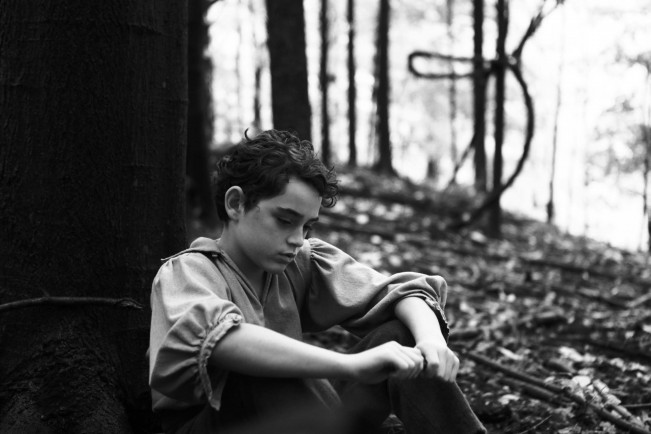By Kim Voynar Voynar@moviecitynews.com
Sundance 2014 Review: The Better Angels
The Better Angels, produced (and clearly strongly influenced) by Terrence Malick and directed by A.J. Edwards in his feature debut, is a stunningly beautiful, vividly black-and-white cinematic painting about the boyhood of Abraham Lincoln on a farm in the remote Indiana frontier during the years 1817-1819. And for lovers of films that veer into the realm of art, it’s a deeply moving visual treat.
Presumably, these particular years in young Lincoln’s life were chosen as the focus of the film because of their profound influence in shaping the boy who would become our 16th president. In 1816 Lincoln’s father, Thomas, notably lost his sizable holdings of land in Kentucky due to property line disputes, forcing the family to relocate to Indiana to make a fresh start. It was during these years that two pivotal events occurred: Lincoln’s mother, Nancy, died of milk sickness in 1818, and his father remarried in 1819 to Sarah Bush Johnston, with whom the boy bonded. Both women strongly influenced the man Abe Lincoln would become.
Edwards moves us along languidly through this pivotal period in Lincoln’s life: The isolation of a frontier farm boy who loved books and learning, growing up in a time and place where physical labor was more valued than intellect. The death of his beloved mother and arrival of his stepmother, two women who understood intuitively that there was something different and special about the boy, and who profoundly shaped his life. The fabled wrestling match, at which he won the grudging respect of rough-and-tumble peers by showing that he had brawn as well as brains. We also see planted the seed of his opposition to slavery, which would come to be a crucial part of his political career.
There are certainly many ways the story of Lincoln as a boy could have been told, but Edwards, a longtime cameraman in Malick’s circle, chooses here the path akin to what one imagines Malick himself might have taken, had he directed the project himself, as he reportedly planned to early in its development. Told largely through voice over taken directly from an interview with Lincoln’s last surviving cousin, who lived with the future president during this time of his life, The Better Angels (not unlike Malick’s own films) lies far more in the realm of impressionistic imagery and poetry than narrative prose.
This is a film created to be seen on a big screen, where the gorgeous cinematography can fill your soul. Dialog is sparse, used only to augment the narration and visuals, with the result that it feels almost like watching a silent film with narration over it. Or perhaps, to be more accurate, it’s like immersing yourself into a black-and-white landscape of stunning beauty, where there happens to be this story happening around you. I certainly couldn’t take my eyes off the screen. Edwards’ time spent as a cameraman on Malick’s films is evident here in the framing of shots, the extensive use of nature in storytelling, and his willingness to let his tale breathe in quiet spaces.
Lack of dialog doesn’t mean lack of need for solid performances – if anything it requires that much more of an actor to convey actions, emotions, moments of connection with each other, without being able to lean much on words to convey meaning. Fortunately for Edwards, his excellent cast is more than up to that task. Jason Clarke as Tom Lincoln, Brit Marling as Lincoln’s mother, Sarah, and Diane Kruger as his stepmother Nancy, are all spot on, evoking the juxtaposition of weariness and hope that embodied life on the frontier. But it’s young Braydon Denney, who plays Abe Lincoln in the tale, who most stood out for me, perfectly capturing the dreamy intellect that conveys the introspective mind of the boy who would grow to be one of our nation’s greatest leaders.
While the film’s high-art house structure and style might limit the film’s appeal to a mainstream audience, for those who revel the use of poetic imagery to tell a story, The Better Angels is a sumptuous feast of starkly contrasted painterly beauty. It is, quite simply, sublime.
















